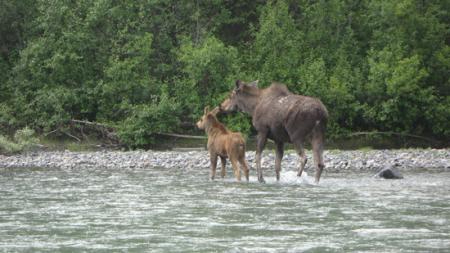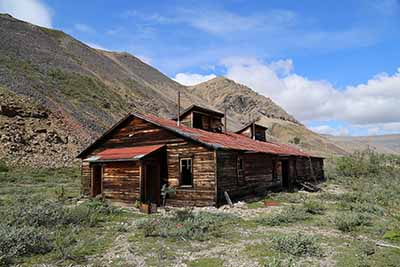 Mackenzie Mountain Inn & Trumpeter Camp Accommodations are situated in the town of Norman Wells, Northwest Territories, Canada. We offer hotel-style rooms & accommodations. The Town of Norman Wells is situated on the north side of the MacKenzie River and is the hub of the Sahtu Region. Norman Wells is the first settlement in the Northwest Territories developed for its nonrenewable resource - oil.
Mackenzie Mountain Inn & Trumpeter Camp Accommodations are situated in the town of Norman Wells, Northwest Territories, Canada. We offer hotel-style rooms & accommodations. The Town of Norman Wells is situated on the north side of the MacKenzie River and is the hub of the Sahtu Region. Norman Wells is the first settlement in the Northwest Territories developed for its nonrenewable resource - oil.
History
The Dene knew of the existence of seeping oil and called the area Le Gohlini (meaning "where the oil is"). Imperial Oil began drilling wells for crude oil in 1919 and built a small refinery. Although the refinery has opened, closed and been rebuilt over the years it currently remains closed when, in the spring of 1985, the Norman Wells pipeline was completed, linking Norman Wells to the south.
Access
Access is primarily by air with Yellowknife being 684 air km away. Winter roads in the Northwest Territories are open for approximately 3 months of the year.
Historical Open / Close Dates
|
WINTER ROAD |
OPEN (15-year average) |
CLOSE (15-year average) |
| Mackenzie Valley | Wrigley to Tulita: January 1 Tulita to Norman Wells: December 29 Norman Wells to Fort Good Hope: Dec 24 Access road to Deline: January 18 Fort Good Hope to Colville Lake: N/A |
Wrigley to Tulita: March 28 Tulita to Norman Wells: April 1 Norman Wells to Fort Good Hope: April 2 Access road to Deline: March 30 Fort Good Hope to Colville Lake: N/A |
For the most up-to-date winter road conditions, visit Winter Roads.
Tourism
The Mackenzie Valley offers visitors a glimpse of traditional Metis and Dene lifestyles alongside rugged mountains, river adventures and breathtaking scenery. Wilderness day trips, fishing for arctic grayling, northern pike & world-class lake trout are just some of the popular activities in the area.
Canol Heritage Trail
 The Canol pipeline was considered the greatest construction project of its time, but it remains a shamefully forgotten period of Canada’s war years, largely overshadowed by the concurrent Alaska Highway project. Under threat from Japan’s attack on Pearl Harbour, the U.S. Government mobilized an army to build a pipeline from Norman Wells to the Yukon border – fuel thought to be needed for aircraft and vehicles, should the threat to the Alaskan coastline become real.
The Canol pipeline was considered the greatest construction project of its time, but it remains a shamefully forgotten period of Canada’s war years, largely overshadowed by the concurrent Alaska Highway project. Under threat from Japan’s attack on Pearl Harbour, the U.S. Government mobilized an army to build a pipeline from Norman Wells to the Yukon border – fuel thought to be needed for aircraft and vehicles, should the threat to the Alaskan coastline become real.
Including distribution lines, nearly 2,700 kilometres of pipe—more than twice the length of the Alaska pipeline—were laid in less than two years and in 13 months of operation, plagued by poor workmaship and spills, the pipeline was abandoned.
Today, hiking the spectacular Canol Heritage Trail can be one of the most rigorous backpacking experiences ever. The 355-kilometre trek follows the route of the defunct military road that once transected the Mackenzie Mountains, taking about 3 weeks to complete.
Today, remediation of the Canol Trail is underway to reduce major environmental and human health risks associated with the abandoned pipeline and related infrastructure. More information can be found here: Canol Trail Remediation Project
The Mighty Mackenzie River
One of the great rivers of the world, the Mackenzie River is Canada's largest river. Starting at Great Slave Lake, it curls north and heads straight to the Arctic Ocean, a whopping 1,738 km long and draining 20% of Canada's water.
Hunting & Fishing
Near the Arctic Circle, Norman Wells is where the adventure begins for many hunters in the Northwest Territories - home to grizzly bear, wolves, Dall's sheep and woodland caribou. The watersheds, rivers, basins and mountains in the northern Mackenzie Mountains of the Northwest Territories offers arguably some of the best hunting in the world. The untouched remoteness of this area, accessible primary by bush aircraft, is beauty and bounty unlike any other.
National Parks in the Northwest Territories
Northwest Territories provides some of the most spectacular national parks in Canada. Below are some links to help you Discover the Spectacular Northwest Territories.

 1-867-322-6092
1-867-322-6092


